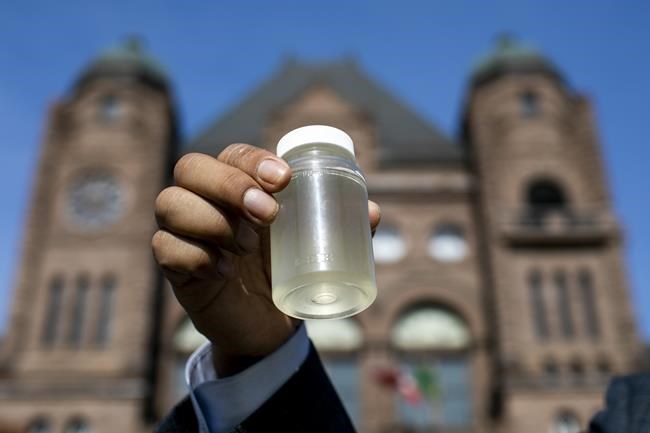OTTAWA — The government did not provide the support needed to ensure First Nations communities have access to safe drinking water, says federal auditor general Karen Hogan in a report released Thursday.
"We are very concerned, and honestly, disheartened that this long-standing issue is still not resolved," Horgan told a news conference in Ottawa.
Indigenous Services Canada won't meet its commitment to eliminate all long-term drinking water advisories by the end of March, something the government admitted late last fall. Hogan also noted the government has not created a regulatory regime for managing drinking water in First Nations communities.
"Access to safe drinking water is a basic human necessity," she said.
"I don't believe anyone would say that this is in any way an acceptable situation in Canada in 2021."
Many First Nations in Canada have had water that’s unsafe to drink from the tap for years and fixing those problems has been a signature promise of the Liberal government.
The report concludes that 100 long-term advisories were lifted between 2015 and 2020 but 60 remained in effect as of Nov. 1, 2020, and almost half of those have been in place for more than a decade.
“Indigenous Services Canada must work in partnership with First Nations to develop and implement a lasting solution for safe drinking water in First Nations communities,” said Hogan.
Hogan said the COVID‑19 pandemic has slowed progress on some projects but many were already delayed.
Bloc Québécois MP Maxime Blanchette Joncas said the government's blaming the pandemic is "a poor excuse."
"First Nations have a right to the minimum subsistence level in terms of drinking water services," Joncas said in a statement in French.
Hogan said the department has put in place many temporary measures to lift drinking water advisories.
"(A) temporary measure pushes the issue a little further down the road, so it's time to find long-term sustainable solutions," she said.
Hogan’s report notes access to safe drinking water is vital to the health and well-being of 330,000 people living in more than 600 First Nations communities across the country.
She said the Canadian government has not updated its funding formula for First Nations water systems for 30 years.
"You should look at things a little more often than 30 years," she said. "We saw that the funding formula wasn't meeting the current needs, let alone, perhaps, future needs that might be there."
She said water-system operators in First Nations communities are currently paid about 30 per cent less than their counterparts in other parts of the country.
"Retention is very difficult, so you can have a water system that might work but you also need a skilled operator to make sure that it's properly maintained and can work for the long term," she said.
Indigenous Services Minister Marc Miller said he welcomes the auditor general's report and agrees with her recommendations.
The funding formula for First Nations water systems was outdated, he said.
"The federal government was only providing 80 per cent of the funding, leaving the 20 per cent up to the community. Not all communities can do that, so we're moving to 100 per cent."
Miller said First Nations communities need the support of the government even after drinking-water advisories are lifted to operate and maintain their water treatment infrastructure.
The report says some First Nations communities continue to experience a lack of access to safe water 15 years after auditors called on the government to address the issue for the first time.
The Liberals began work on the problems by allocating more than $2 billion to improve water and wastewater in First Nations communities in their 2016-17 budget, including funding to operate and maintain public drinking water systems.
This government’s funding to resolve the situation ends next month.
Indigenous Services Canada estimated that $1.79 billion had actually been spent by the end of November.
The government promised an additional $1.5 billion in funding, starting in 2026-27, for water treatment projects in First Nations communities in its fall economic statement.
The government said the new funding aims to accelerate the work to end all the long-term drinking water advisories.
The announcement included an additional $114 million per year, starting in 2026–27, for the operation and maintenance of water and wastewater systems in First Nations communities.
"(The new funding) works on some of the acceleration measures that we need to do throughout COVID because we have, in fact, lost the construction season," Miller said.
He said the new money will transform the government's approach to providing clean water in Indigenous communities by getting it more involved in the areas of operations and maintenance.
"The conclusion of the auditor general is a very pertinent one. It's one that I and my team saw going into the pandemic," he said
"We need to rethink the framework with which we approach safe water and clean water on reserves to one that really reflects our relationship with nation to nation, so that will take some engagement and some thinking."
This report by The Canadian Press was first published Feb. 25, 2021.
—With files from Christopher Reynolds.
———
This story was produced with the financial assistance of the Facebook and Canadian Press News Fellowship.
Maan Alhmidi, The Canadian Press



